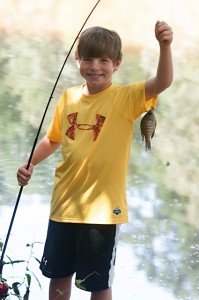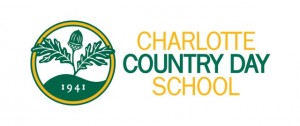By Adele Paynter, Head of Lower School, Charlotte Country Day School
When summer hits, parents often worry about what to do so that their child will hit the ground running for the start of school in the fall. After all, the research has shown that all kids take a slide backwards in their learning if they get the whole summer “off.” On the other hand, summer is a time for kids to relax and enjoy themselves. So, how do you get the best of both worlds?
For me, the answer is simple—give your child meaningful opportunities to explore, get messy, and play! Einstein called play the “highest form of research,” and Maria Montessori called it “the work of children.” It turns out they were right. Scientists studying brain development are finding concrete evidence that there is real power in giving kids time and space to play. It’s not just “plain old fun;” it’s also crucial ‘work’ for kids to learn about the world and hone the skills that will make them happy, competent, and successful adults: critical thinking skills, communication skills, collaboration, and creative thinking.
Summer is a wonderful time for kids to go deep and really immerse themselves in things they love. While the school year favors the generalist (a little bit of math, a little bit of science, a little bit of reading, etc.), summertime can be for the specialist. If your child loves art, do art. If they love taking things apart, let them tinker. If your child loves to read, surround them with books.
Here are 10 ways to keep your child learning, engaged, having fun, and playing this summer!
Reading: The one expectation for “work” over the summer is READING. As we know from research, reading is the best way to improve vocabulary, fluency, and comprehension, and it’s been shown to improve empathy skills as well. However, reading should feel like anything but work for your child. You want them to be immersed in language-rich, enjoyable texts (books, magazines, audio books) in a low-stress, enjoyable way. Throughout the summer, vary the kinds of reading experiences your child has (story hour at the library, read alouds at night, independent reading time throughout the week, etc.). Our Library Haiku page is chock-full of helpful resources to help you find just the right kinds of reading materials for your child to keep them hooked all summer. Also, consider signing up your child for the Public Library summer reading contests. Your local children’s librarian will help you every step of the way, and the incentives are addictive!
Journaling: One great way to keep your child writing and telling stories over the summer is to keep a summer journal. This is a fun way to document all the adventures your family has and to practice essential writing skills (storytelling, organization, mechanics). You can turn it into a keepsake by adding drawings and/or photos to help tell the story of the summer. Another fun way to encourage writing is to do a postcard exchange with friends/families; after all, there’s nothing more rewarding for kids than getting a response in the mailbox!
Get outside: So much learning can happen if you give your child time to play outdoors. We’re lucky in this area to have access to great parks (mountains, lakes, creeks, etc.) right in the city and a quick day trip away. Encourage your child to get dirty, look for cool creatures and plants, and observe the world around them. This will help them build their observation skills, learn to categorize, and build their critical thinking skills. Kids who notice the world and make hypotheses about how and why things are the way they are are the same kids who bring those critical thinking skills to bear in the classroom. For a less “wild” experience, have your child visit some of the local gardens (arboretum, botanical gardens). They have amazing opportunities for kids to learn from in-house experts.
Citizen Scientists: This city also offers kids real world, authentic ways to contribute to larger scientific projects. Organizations like the Charlotte Nature Museum and Mecklenburg Audubon are often looking for people to engage in pollinator and bird counts—data which helps scientists around the world better study and protect our native species. Kids learn communication and collaboration skills, as well as hone their observation and data collection skills.
Building: Engineering is a great way to integrate math and science learning. Whether it’s laying out a garden plot, building birdhouses, or just making things for fun (think rollercoasters and ramps), building encourages students to follow directions, use math skills (geometry, measuring, etc.), and hone their design thinking skills: dream, design, create, revise! Lowe’s and Home Depot will often offer weekend clinics for kids to learn how to use tools safely and independently—great life skill! If your child gets really inspired, s/he can apply for a space at the Charlotte Mini Maker Faire in October.
Cooking & Baking: Cooking and baking are great ways for kids to practice all kinds of math skills (precision, measuring, etc.), science skills (chemical reactions), and fine motor skills. There are cooking classes (Flour Power Kids) or you can just open up your refrigerator and start experimenting. Add some additional math practice to the equation and have your child set up a bake sale. Donate the proceeds to your child’s favorite cause.
Coding: Get your child coding with Scratch! It’s easy to learn (for kids at least!), and they can create all sorts of fun games and visuals.
Drama: If your child has a proclivity for drama, harness it! Charlotte offers all sorts of opportunities for kids to see shows in action and learn the craft of acting. Imaginon is a particularly neat collaboration between library and theater. Acting is a great way to build confidence and communication skills and to foster empathy and perspective-taking. Afterall, when you act, you are literally stepping into someone’s shoes!
Art: Charlotte offers so many opportunities for kids to explore artwork—from the sculpture gardens at the Daniel Stowe Botanical Gardens to the exhibits at the Mint Museum. Not only can you spend time talking about great artwork with your child (try these prompts from Project Zero) but your child can also create art him/herself. Many of the local museums offer opportunities for kids to do all kinds of art, from making jewelry to learning to draw.
Math: If your child needs help building math fact fluency, games are a great way to keep them practicing (and pass the hours on a car ride!). There are a multitude of games online, and your child also knows a lot of games from school that they can teach you (Top It, Memory Match, Monster Squeeze, Number Grid Game, Two Fisted Penny Addition, Penny Cup, Baseball Multiplication, Basketball Addition, etc.).
Most importantly, share your interests and passions with your child, and model for them what it means to be curious, to take risks, and to be a lifelong learner! Send photos of your “nontraditional” summer learning, so I can see your little ones at work and at play at the same time.
Charlotte Country Day School
1440 Carmel Road
Charlotte, NC 28226
(704) 943-4500
website
facebook
twitter:@ccdsnews



